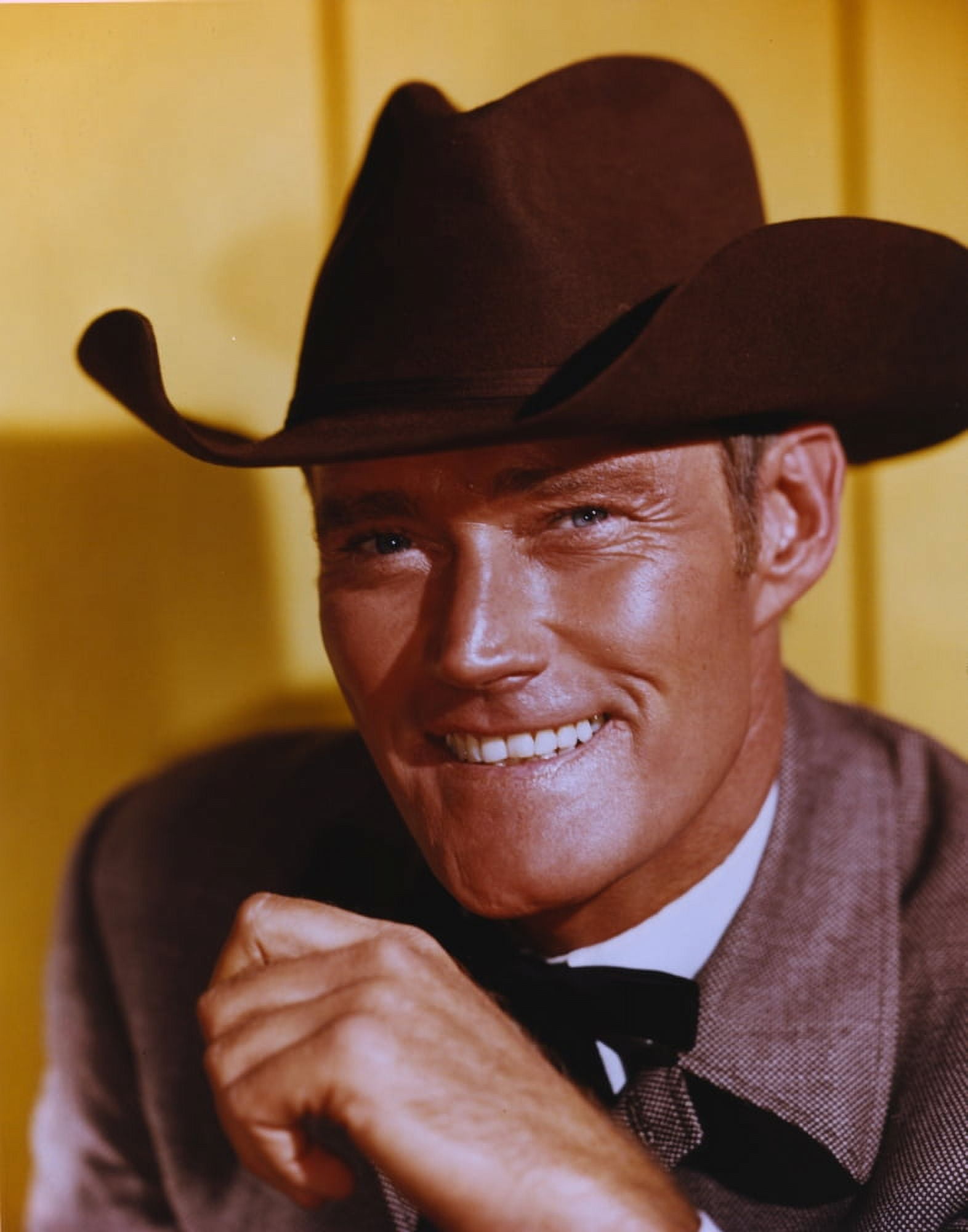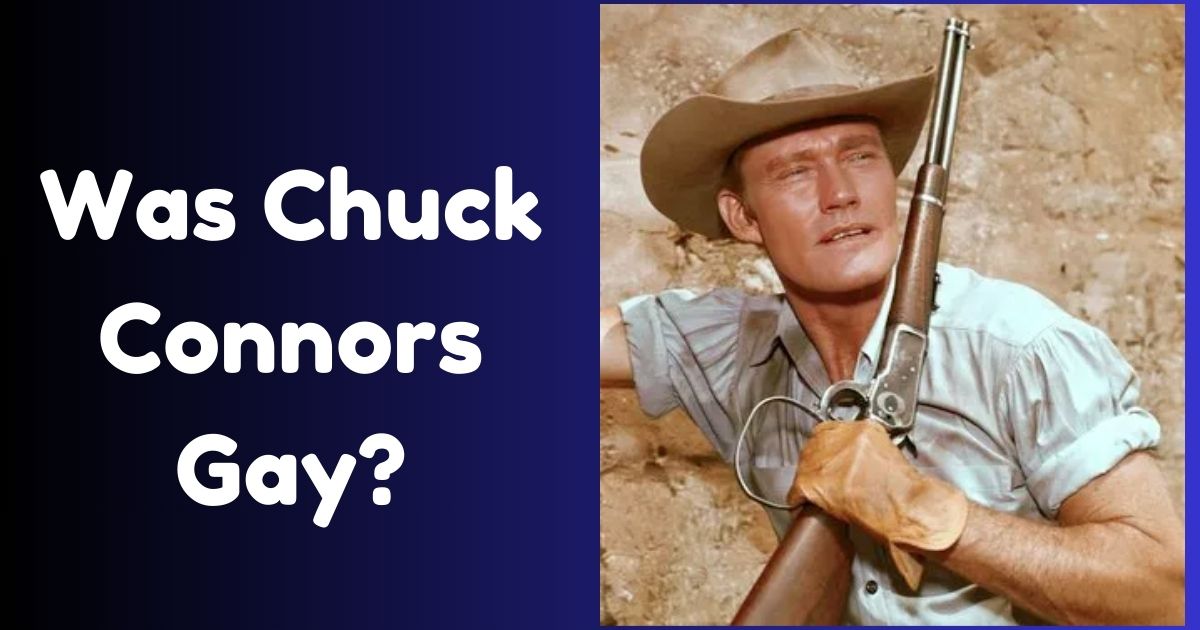Was The Actor Chuck Connors Gay? Unveiling The Truth Behind The Rumors
Let’s dive right into it, folks. The question “was the actor Chuck Connors gay” has sparked curiosity for years among fans, historians, and even casual observers of Hollywood’s golden era. Chuck Connors, a name synonymous with rugged masculinity and classic American charm, was an iconic figure in both film and television. But as with many stars from his time, whispers and speculations about his personal life have persisted long after his career ended. So, let’s unpack this mystery, shall we?
Chuck Connors wasn’t just another pretty face in Tinseltown. He carved out a niche for himself as a tough, no-nonsense leading man, often playing roles that embodied strength and resilience. From his breakout role in “The Rifleman” to his numerous film appearances, Connors became a household name. Yet, beneath the surface of his on-screen persona, there were whispers that hinted at a more complex personal life.
Now, before we jump into the nitty-gritty, let me set the stage. This isn’t just about gossip or tabloid fodder. It’s about understanding the man behind the legend, exploring the cultural context of his era, and separating fact from fiction. So, grab your favorite drink, sit back, and let’s dig deep into the life of Chuck Connors.
Read also:Emilio Valli The Life Legacy And Influence Of A True Icon
Biography of Chuck Connors: A Quick Overview
Early Life and Career
Born on September 10, 1921, in Brooklyn, New York, Chuck Connors’ real name was Charles W. Connors. He wasn’t always destined for the silver screen. Before he became an actor, Connors was an accomplished athlete. He played baseball professionally, even getting drafted by the Brooklyn Dodgers. But life had other plans for him, and after an injury ended his sports career, he turned to acting.
His transition to acting wasn’t immediate. Connors worked various jobs, including as a sportscaster, before landing his first major role. His athletic build and commanding presence made him a natural fit for roles that required physical prowess and charisma. By the late 1950s, he had established himself as a leading man in Hollywood.
Table: Key Facts About Chuck Connors
Here’s a quick rundown of some essential facts about Chuck Connors:
| Full Name | Charles W. Connors |
|---|---|
| Date of Birth | September 10, 1921 |
| Place of Birth | Brooklyn, New York |
| Profession | Actor, Athlete |
| Spouse(s) | Harriet Paterson, Gail Patterson (both marriages ended in divorce) |
| Children | 2 daughters |
| Notable Works | The Rifleman, Big House, U.S. Marshall |
Was Chuck Connors Gay? Let’s Talk About the Rumors
Now, here’s the big question everyone wants answered. Was Chuck Connors gay? The short answer is that there’s no definitive proof to support this claim. However, rumors have persisted for decades, fueled by a combination of circumstantial evidence and cultural assumptions about masculinity in Hollywood.
During Chuck Connors’ time, the entertainment industry was notoriously secretive about the personal lives of its stars. Homosexuality was often stigmatized, and many actors felt pressured to maintain a heterosexual image to protect their careers. This cultural backdrop makes it challenging to separate fact from fiction when examining the lives of actors like Connors.
So, what exactly sparked these rumors? Let’s break it down.
Read also:Albemarle Catalysts Revolutionizing The Chemical Industry
Factors Contributing to the Speculation
1. Lack of Public Relationships
One of the reasons people speculated about Chuck Connors’ sexuality was his relatively private personal life. Despite being a major star, Connors didn’t publicly date many women during the height of his career. While he was married twice, both marriages ended in divorce, and he rarely spoke about his romantic life in interviews.
2. Athletic Background
Connors’ athletic background also played a role in the speculation. In the mid-20th century, there was a prevailing stereotype that athletes were inherently heterosexual. When an athlete like Connors transitioned to acting, any deviation from this stereotype was often met with suspicion.
3. Cultural Context
Let’s not forget the cultural context of the time. The 1950s and 60s were periods when societal norms around gender and sexuality were rigid. Any deviation from these norms was often met with whispers and gossip. Chuck Connors, with his stoic, masculine persona, became an easy target for speculation.
Debunking the Myths
Now that we’ve explored the factors contributing to the rumors, it’s time to address the elephant in the room. Was Chuck Connors gay? The truth is, we may never know for sure. However, there are a few things we can say with certainty:
- Chuck Connors was married twice and had two daughters. While this doesn’t necessarily rule out the possibility of him being bisexual, it does suggest a more complex personal life than the rumors imply.
- There’s no concrete evidence, such as personal letters or interviews, to support the claim that Connors was gay.
- Speculation about an actor’s sexuality often stems from societal biases rather than factual evidence.
Chuck Connors’ Legacy: Beyond the Rumors
Regardless of the speculation surrounding his personal life, Chuck Connors left an indelible mark on the entertainment industry. His portrayal of Lucas McCain in “The Rifleman” remains one of the most iconic roles in television history. The show ran for five seasons and was praised for its strong moral themes and family-friendly content.
Connors was also known for his philanthropy and commitment to giving back to the community. He was involved in numerous charitable endeavors, particularly in the realm of children’s welfare. This aspect of his legacy is often overshadowed by the rumors about his personal life, but it’s a crucial part of understanding the man behind the legend.
How Hollywood Views Queer History
1. The Evolution of LGBTQ+ Representation
Hollywood’s relationship with LGBTQ+ representation has come a long way since Chuck Connors’ time. While the industry was once secretive about the personal lives of its stars, today, many actors and creators openly embrace their identities. This shift reflects broader societal changes in how we view gender and sexuality.
2. The Importance of Acceptance
It’s important to remember that the speculation about Chuck Connors’ sexuality doesn’t define his legacy. What truly matters is the work he created and the impact he had on his fans. Whether or not he was gay, Connors was a talented actor who brought joy and entertainment to millions of people.
Chuck Connors’ Impact on Pop Culture
Chuck Connors’ influence extends far beyond the rumors about his personal life. His roles in films like “Big House” and “U.S. Marshal” cemented his status as a leading man in Hollywood. But his most enduring legacy is undoubtedly “The Rifleman,” a show that resonated with audiences across generations.
Connors’ portrayal of Lucas McCain was groundbreaking for its time. The character was a single father raising his son in the Wild West, navigating challenges with integrity and courage. This representation of fatherhood was revolutionary in the 1950s and continues to inspire viewers today.
Conclusion: What We Can Learn from Chuck Connors
As we wrap up this exploration of Chuck Connors’ life and legacy, it’s clear that the question “was the actor Chuck Connors gay” is more complex than it seems. While the rumors persist, they don’t define the man or his contributions to the entertainment industry. Chuck Connors was a talented actor, a devoted father, and a philanthropist who made a lasting impact on pop culture.
So, what can we take away from this? First, it’s important to approach the personal lives of historical figures with nuance and understanding. Speculation and gossip can overshadow the real contributions these individuals made to their fields. Second, as society continues to evolve, we must celebrate diversity in all its forms, including the stories of LGBTQ+ individuals in history.
Now, I want to hear from you. What are your thoughts on Chuck Connors and the rumors surrounding his life? Leave a comment below and let’s continue the conversation. And don’t forget to share this article with your friends who love classic Hollywood stories. Together, let’s keep the legacy of Chuck Connors alive!
Table of Contents
- Biography of Chuck Connors: A Quick Overview
- Was Chuck Connors Gay? Let’s Talk About the Rumors
- Factors Contributing to the Speculation
- Debunking the Myths
- Chuck Connors’ Legacy: Beyond the Rumors
- How Hollywood Views Queer History
- Chuck Connors’ Impact on Pop Culture
- Conclusion: What We Can Learn from Chuck Connors
Article Recommendations


